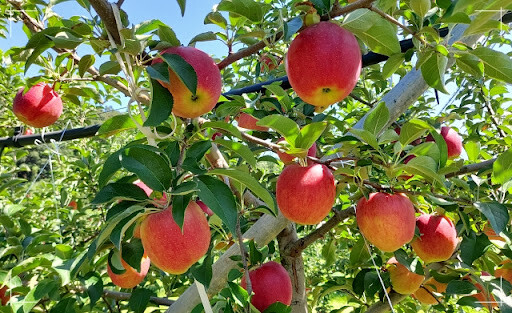
SEOUL, South Korea – Climate change is reshaping South Korea’s agricultural landscape, with apple cultivation experiencing a significant shift northward. According to a recent report by the National Agricultural Cooperative Federation (NACF), the apple cultivation area in Gangwon Province has surged approximately sevenfold over the past decade.
As temperatures rise due to climate change, regions traditionally known for apple production, such as Gyeongbuk Province, are facing increasing difficulties. The number of apple farms in Gyeongbuk has declined by 22% over the past decade.
Despite the shift, Gyeongbuk remains the largest apple-producing region in South Korea, accounting for more than 50% of the total production, farm households, and cultivated area. In 2023, five regions in Gyeongbuk and Gyeongnam provinces contributed to nearly half of the nation's apple shipments.
Shifting Varieties
Along with the geographical shift, there has also been a noticeable change in apple varieties. Fuji, Miyanma, Hongro, Aori (Tsugaru), and Mishima together accounted for 93% and 92% of the total shipments and wholesale market transactions, respectively, in 2023. While the share of the traditional Fuji variety has been declining, its improved variant, Miyanma, has seen a surge in popularity.
"Miyanma, a late-season variety, is a superior cultivar of Fuji, boasting higher sugar content and denser flesh, making it more preferred by consumers," said a NACF official. "While further analysis is needed, the rising market share of Miyanma could be attributed to climate change."
New varieties, such as Shinano Gold, a mid-season yellow apple, are also gaining traction as the climate and agricultural environment change.
Climate-Induced Changes
Apples thrive in cool regions with an annual average temperature of 8 to 11 degrees Celsius and a growing season average temperature of 15 to 18 degrees Celsius. Between 1981 and 2010, apples could be cultivated throughout South Korea. However, projections indicate that by the 2030s, apple cultivation will be limited to regions like Gangwon and Chungbuk. Furthermore, some forecasts suggest that by the 2070s, apple cultivation will be restricted to a few areas in Gangwon Province due to the continued shift towards a subtropical climate.
In response to these changes, the Ministry of Agriculture, Food and Rural Affairs plans to expand the apple cultivation area in five major producing regions of Gangwon Province, from 931 hectares in 2023 to 2,000 hectares by 2030.
"Climate change is accelerating the shift in apple production regions," said a NACF official. "We need to increase support for apple farmers, including the development of new varieties and crop diversification."
[Copyright (c) Global Economic Times. All Rights Reserved.]






























